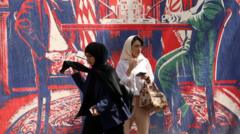Recent developments indicate a worrying acceleration in Iran's uranium enrichment activities, leading to heightened international scrutiny and calls for urgent diplomatic action.
Iran's Uranium Stockpile Grows, Prompting Concerns from IAEA

Iran's Uranium Stockpile Grows, Prompting Concerns from IAEA
The International Atomic Energy Agency warns that Iran's uranium enrichment raises global alarm over potential nuclear armament.
Iran has considerably intensified its production of highly enriched uranium, as outlined in a recent confidential report by the International Atomic Energy Agency (IAEA). This report, which has been reviewed by the BBC, reveals that Iran now possesses over 400 kg of uranium enriched to 60% purity, a significant jump of approximately 50% in just three months. This level of enrichment surpasses civilian needs and approaches weapons-grade capability, potentially enough for Iran to produce around ten nuclear weapons if the material is further refined. Notably, Iran is now the only non-nuclear weapon state engaging in uranium production at this scale.
Iran has consistently maintained that its nuclear program is for peaceful purposes, yet the IAEA has expressed its inability to verify this claim. The agency identified that Iran has been producing highly enriched uranium at a pace suggesting the capability to create one nuclear weapon per month, particularly in the context of ongoing nuclear discussions between Tehran and Washington.
IAEA Director General Rafael Grossi has categorized the increasing production and stockpile of highly enriched uranium by Iran as "serious concern." This alarming report may galvanize the US, UK, France, and Germany to urge the IAEA's board of governors to declare that Iran is in violation of its non-proliferation obligations.
In response to the IAEA’s findings, Israel has accused Iran of a determined effort to develop nuclear weapons, with Prime Minister Benjamin Netanyahu emphasizing that such an enrichment level has no civil justification. Iranian Foreign Minister Abbas Araghchi countered that Tehran finds nuclear weapons "unacceptable" and expressed agreement with the idea that such arms should not exist.
US officials indicate that if Iran opts to pursue nuclear weapons, they could produce weapons-grade material in less than two weeks, with the prospect of constructing a bomb within a few months. The IAEA report not only highlights current enriching efforts but also points to concerning past activities, including undeclared nuclear work at three undisclosed locations: Lavisan-Shian, Varamin, and Turquzabad.
Despite ongoing talks for a revised nuclear deal that began in April, both sides continue to disagree over core issues, most notably whether Iran will maintain its enrichment activities under any future agreements. Iran has historically denied allegations of seeking nuclear weapons, yet the IAEA asserts that it "cannot verify" this narrative, mainly due to Iran’s non-cooperation with inspectors and unresolved inquiries regarding its nuclear history.
Recent comments from advisors to Supreme Leader Ayatollah Ali Khamenei have alarmed Western diplomats, suggesting that Iran may reconsider its longstanding opposition to developing nuclear weapons amidst escalating international pressures. The IAEA board is expected to convene shortly to determine future actions, with anticipation that Iran may be referred to the UN Security Council, marking a significant step in international diplomatic efforts concerning the nation’s nuclear activities.



















